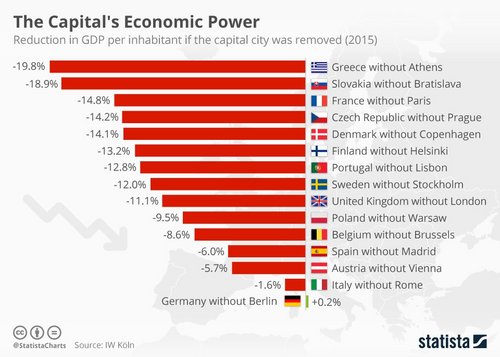In almost every European country, the capital contributes strongly to the countries’ economy.However, according to the Cologne Institute for Economic Research (IW), there is one exemption: Germany. Without Berlin, the German gross domestic product (GDP) per capita would be even higher.
Capital cities: Usually an economic driving force
If Berlin and its inhabitants are removed from the calculation, the 2015 German GDP per capita increased by 0.2 percent. In most other EU countries, the capital is an indispensable economic driving force – from Finland and Sweden to Great Britain and France down to Spain and Portugal. The most extreme example is Greece: Without Athens, Greece's GDP per inhabitant would have fallen by almost 20 percent. Quite similarly, the level of prosperity in Slovakia would be about 19 percent lower without Bratislava.
A wealthy capital, however, is not an end in itself. Problems of a too strong focus on one economic powerhouse were lately to be observed in the Brexit referendum, revealing a clear divide between the City of London and the rest of the UK.
The relatively weak economic position of Berlin is representative for the strength of the German federal system: Germany has many different economic centers – often also in rural areas, where numerous successful medium-sized companies are located. In other European countries, not only the administration, but also the economic power is often concentrated in the capital.
Apart from Berlin, the economic power of Rome is relatively weak. The Italian capital increases the GDP per capita only slightly. This is probably due to the strength of other economic centers, such as Milan and Turin.
Graphic: statista.de
More on the topic

Energy consumption: Targets threaten efficiency of EU climate and decarbonization policies
Increasingly stringent energy consumption targets for the year 2030 flanked by national energy efficiency targets are about to being agreed at the EU level. A study by the German Economic Institute (IW) shows that these targets when applied to ETS-sectors, ...
IW
(Un-)Fair taxation of the digital economy
The EU would neglect its responsibility for the mismatch of tax policies among member states by implementing a taxation of the digital economy. It would translate into a tax increase for a specific group of companies, which would make the classification of ...
IW
